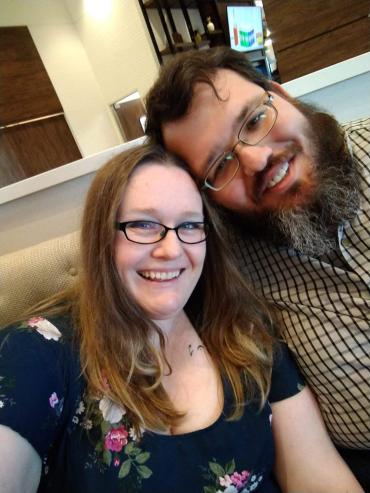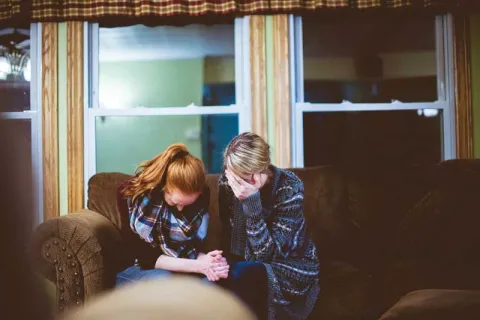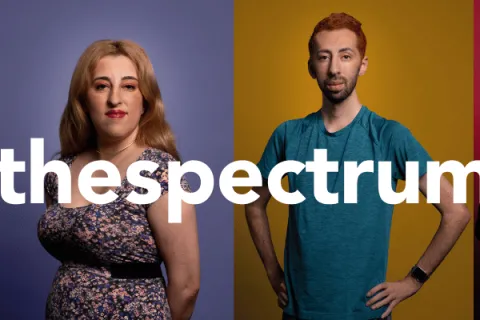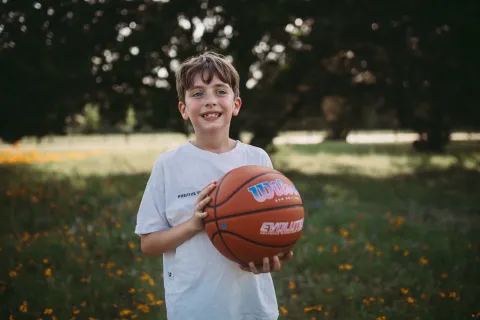Autism and marriage
Living happily ever after when one spouse has autism
By Cassie HauschildtThere is a myth that autistic people cannot have meaningful romantic relationships. There is even a reality TV show dedicated to autistic people dating other autistic people. While it puts into focus that autism overwhelmingly affects one’s social capabilities, it seems to me to do more to perpetuate stereotypes, just to entertain audiences.
But I am living proof that people with autism are capable of love and marriage – even with a non-autistic partner.
In fact, I was diagnosed with autism after I was married. I had an existing diagnosis of anxiety and attributed most of my difficulties and quirks to that. But my spouse helped me realize I probably had autism. Our son had been recently diagnosed and so we were researching it. I saw a lot of myself in what we were reading. But my husband came right out with it and said, “Do you realize you have autism?” I responded, “You’re lucky I realized this yesterday, or I’d probably be offended right now.” The fact is I felt seen, loved and supported by him.
My autism affects almost every aspect of our relationship. But the fact that both of us are aware and understanding of my differences helps us manage each others needs and expectations. Is it always easy? No, but what relationship is?
To give you a better idea of ours though, I enlisted the help of my spouse and asked him about some of the common realities that are part of being in a relationship with an autistic person. Below you will find both of our points of view. By no means are we experts on any matters but our own. But by being open with our lives and how we make things work, we hope you can see romantic relationships are possible for and with people with autism.
STIMMING
My point of view
Because my autism was diagnosed later in life, most of my stims are minor and unnoticeable to most people. However, when you’re around me all day, you will likely notice them. One of my favorite stims is what I call “crunching” my toes. Essentially bending them against something solid and clicking the knuckles in and out. In the beginning of our relationship, I loved to do this to my husband’s legs as we were cuddling.
His point of view
I despised this. But I was able to explain it like this: “I know this is an important input for you, but it is uncomfortable for me. Could you just not do it on my skin?” So she gets to still do it, but I am not her scratching post.
Beyond the crunching, the way she obsessively does things equally is extremely endearing and one of the things I love about her, even if it takes us a few extra minutes to get out the door because she’s tapping the door handle with the other hand. Sure, it’s different, and the typical world may see it as annoying. But it rarely affects me, and not doing it would extremely affect her, which would also affect me.
FOOD AVERSIONS
My point of view
I am what I have always called a “texture eater”. There are very specific textures in foods that, no matter how hard I try, or how good it tastes, I cannot eat. My husband has been understanding of this from the beginning of our relationship. So if there's a food that's new at a restaurant that I want to try, he can actually take a bite and tell me whether or not I'll be able to swallow it before I do. And if I try a food and cannot eat it, he will help me order something new from the waiter. I’m often embarrassed and would rather just not eat. But he asks me what was wrong with the food and can help me get something else.
His point of view
After eight years together, I can now take a bite of a food and know whether or not she will be able to handle it. This has been an incredible benefit. Fortunately, I’m an adventurous eater, so I don’t mind trying new things. The best part? If she doesn’t like it, I get two meals.
PHYSICAL AVERSIONS
My point of view
After the puppy love wore off, I became averse to physical touch. Having two children touching me all day has made it worse. This has required a huge but necessary adjustment for my husband. We have overcome this by strengthening other areas of our relationship, such as quality time together. We try to have one to two hours together after the kids go to bed every night, before we go to sleep, where we just enjoy the same game or TV show together while not touching.
His point of view
This has been the hardest for me to overcome. Touch is one of my main love languages, and not being able to touch my wife as much as I’d like can be extremely difficult. However, this was the case even before she had an official diagnosis of autism. She gets touched-out quickly, and seeing her constant physical interactions with our two children, I am even more understanding of the situation. I will say, when she has the ability to enjoy more physical touch, it makes it far more meaningful to me.
HYPERFIXATIONS
My point of view
Within the first few months of dating, my husband realized that if I loved something, I loved it to the point of obsession. And while he doesn’t always enjoy things the same amount as I do, or sometimes even at all, he always tries to do them with me because he knows that I am going to be authentically me when I’m participating in these activities. Escape rooms are one example. I am obsessed with escape rooms. They are our go-to date night activity. My husband doesn’t like them quite as much as I do (and even that is an understatement), nor is he quite as good at puzzles as I am. But he knows how much they bring me joy, so he does them with me. Don’t worry, I also do things he enjoys, like seeing movies in theaters. He does let me bring a quiet hand activity like knitting that I can do without bothering him or anyone else in the theater though.
His point of view
It was supposed to be one escape room. On MY birthday weekend. We went to the Boy Scout Museum and Medieval Times as I requested. We even got multiple champagne bottles in the fancy hotel room. But the rest of the weekend was spent…doing escape rooms. It was definitely frustrating for me at first. But now it’s become “our thing” (when we can afford it and have a babysitter). In fact, I’ve asked her not to do escape rooms without me because I really do enjoy doing them with her.
COMPROMOSE AND ACCEPTANCE
My point of view
In my opinion, we should help our partners understand by being open and honest. I almost didn’t even get to date my husband because, when we first started chatting, I was very upfront with my faults, knowing I could not mask them. I was so honest about my issues, his then roommate was convinced I was a pathological liar – because he thought no one could be that honest. However, maintaining a space of honesty, even when it’s hard, is what keeps us successful in our relationship. Had I known about my autism then, I would have disclosed it probably before the first date. I had no interest in wasting my time with someone who couldn’t handle me.
Sure I don’t want to cuddle as much as he does. On his birthday I made him do four escape rooms because it was my newest obsession and I couldn’t imagine anyone not loving it as much. But also, I can smell and hear things that he can’t. I even saved the house from burning down thanks to this. And most importantly, we both have the ability to laugh at ourselves and the struggles that life throws at us in general. People often comment that they’ve never seen a relationship quite like ours, and I wouldn’t have it any other way.
His point of view
I wish we could see more movies in theaters together. Or maybe play more Magic the Gathering together. Or have more friends over for BBQs or random gatherings. But, overwhelmingly, the thing keeping us from those things are less her and more the fact we have two children, one of whom has moderate-severe autism. It’s hard to find and afford a babysitter on top of a date night. It helps that she’s self-aware of her differences, so she goes out of her way to buy me things or seek out activities she knows I’d enjoy when she feels we’ve done a lot of things for her. She also suggests I do activities out with friends so she can stay home with the kids, and I do the same for her.
For more information on autism and relationships, check out the following:
- Autistic Adults and Transitioning Relationships
- Dating: Tips for autistic adults
- Falling in love on the autism spectrum
About the author: Cassie Hauschildt is a married self-advocate and mother of an autistic son, Percival, who was diagnosed at 20 months old. She dedicates her time to mentoring parents of autistic kids through the tough first few months post-diagnosis. She also is trying to get rid of the negativity surrounding ABA therapy. She does this through humor while using real talk on her TikTok @AnotherAutismMom. She also runs “The Dino and Nuggets Corner” Facebook Group. Hear her journey to getting her autism diagnosis with Autism Speaks Eileen Lamb here: Adulting on the Spectrum: Realizing my autism after my child’s diagnosis.









